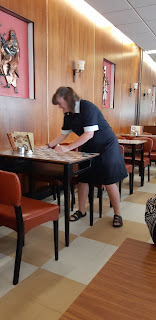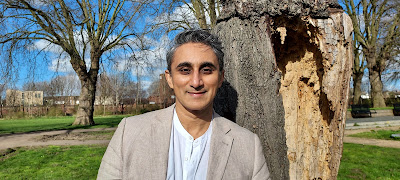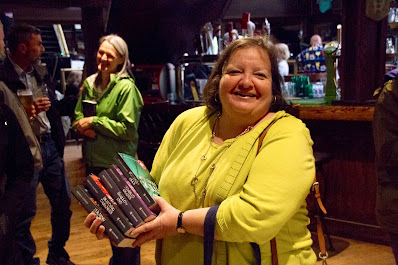This Friday, we're joined by my friend and guest author, Vaseem Khan, author of the Persis Wadia series of historical crime fiction novels set in 1950s India. His latest, The Lost Man of Bombay, is out this month.
Do you draw inspiration from rejection or encouragement? Who is your biggest champion? In order to improve, do we need cheerleaders? Or doubters?
I have a friend who has made it his life’s mission to post inspiring WhatsApp posts every morning to our group of about 60. “Belief is the little place within your spirit where magic grows.” “When you find no solution to a problem it’s because there is no problem, only a truth to be accepted.”
That one was the final straw.
I edited the quote and posted it back: “When you find no solution to a problem it’s probably because you’re too thick or lazy to solve it.”
Needless to say, puncturing my friend’s zen bubble didn’t go down too well. He considers himself the spiritual cheerleader of our group and his brand of relentless optimism certainly appeals to some.
I’m a bit more of a pragmatist.
They say that finance and politics attract a disproportionate number of narcissists. Authors, in my opinion, are drawn from a wider gene pool. I’ve met shy, self-effacing types so contorted with self-doubt that they can barely stand straight; I’ve met the kind who’d make Boris Johnson seem as humble as a vicar. Because of this I believe we all have different needs. Some of us need a good kick in the derrière to get us going. Others need a cuddle and an arm around the shoulder. Still others are self-starters, the sort of person who runs ultra-marathons through Death Valley (because normal marathons are for wimps, obviously).
Such people rarely suffer from doubt. Unfortunately, having zero self-doubt means you’re also unlikely to take any lessons from failure. We’ll talk about that in a second.
They say you have to hit 10,000 balls to become good at tennis. Well, that’s bollocks for a start. If your hand-eye co-ordination is shit you can hit as many balls as you like and you still won’t get anywhere near Wimbledon. In fact, most of those balls will probably end up in your own face. I know of what I speak. I’ve spent my life trying to play cricket. I’m an average player in a very amateur league. The only elite skills I and my teammates possess are the ability to eat massive post-match buffets. There are certain genetic gifts that need to be in place to make it as a professional sportsperson.
But the principle is sound. Practise does make better, if not perfect. Write a million words, and see if I’m wrong.
And writing relies far less on some sort of ineffable genetic talent – you only have to look at some of the authors that become successful to be left scratching your heads. No one is born with the ‘gift’. You learn it, and you earn it.
Let’s talk about rejection.
I wrote my first novel aged 17 – a Terry Pratchett-style fantasy – and sent it in to agents, expecting the commencement of a life of fame and riches. There was one small problem. The book was crap.
I wrote 6 more novels over the next 23 years, across multiple genres, blanket-bombing agents each time I finished one and garnering enough rejection letters to wallpaper Buckingham Palace. How’s that for rejection? (It’s like being punched in the face repeatedly by the very people you want to love you the most.)
Was I inspired by all this negativity? Well, once I’d stopped blubbing and dragged myself up off the floor, surprisingly, yes. Here’s the truth… if you really REALLY want to be a writer, then two things must already be true: (1) Deep down you believe that you are a writer (2) You are consumed by a never-ending cascade of ideas for books.
And that really is all the raw material you need.
For me, the rejections forced me to analyse my work with brutal honesty. The writing wasn’t good enough. The characters weren’t well drawn enough. The plots were contrived or just not the sort of thing anyone wanted to read. I needed to be better.
In my thirties, I decided to make a list of 100 of the greatest novels ever written – culled from prize lists, The Times and The Telegraph round-ups, etc – and then read them while making copious notes. It took 5 years but it was better than any writing class I could have taken. I learnt about plot, character, and rhythm. My prose improved by an order of magnitude. It was as if these great writers – from Hemingway to Attwood to Rushdie – were acting as my personal tutors, whispering in my ear: You’ve got the right stuff. You can make it. Keep going.
Did it work?
Yes. Over the years, the responses from agents changed from ‘go throw yourself under a bus, you talentless hack’ to ‘we like your writing, but the book doesn’t suit our current list. Send us the next thing you write.’ Those tiny crumbs of comfort – like the occasional sliver of frozen human buttock for a man stranded in the Andes after a plane crash (this happened, look it up) – were enough.
All of this happened in a vacuum. For 23 years, I had no actual cheerleaders or champions.
I am a British Asian. In my extended family community, you could count the number of people who read fiction on one hand. (To be fair, back then, most couldn’t read. Or count.) My dad worked as a labourer in an industrial bakery, achieving the giddy heights of Foreman no. 12 before he hit the ‘brown ceiling’. I loved him, but he never understood my desire to write. Telling him I wanted to be an author was akin to me telling him I wanted to become a bareback rodeo rider or a nun. He was infused with the immigrant dream of his children using the ladder of education to find a better life. He’d happily pay for textbooks but the idea of forking over the little cash we had for stuff that some “white person had made up” made a little vein throb at his temple.
It was my mother who took me to the library every week so I could take out four books with those little blue cards they gave you back then.
I suppose, in a way, my parents were my cheerleaders – because without that mixture of a solid education and access to books I’d have had about as much chance of becoming a writer as Putin has of winning the Nobel Peace Prize. (Today my biggest cheerleaders are my young nephews and nieces. They love googling me. The idea of me being on the Internet makes them think I’m a celebrity on a par with Beyoncé and Mr Tumble.)
Anyway… Rejection is hard. Rejection implies that we’re not good enough, that we’re lacking in some department. (I’m reminded of that lurid joke about the ultimate rejection: when you’re, ahem, pleasuring yourself and your hand falls asleep…)
The good news is that you can, as the saying goes, fail forwards.
At the age of 40, I was finally published with The Unexpected Inheritance of Inspector Chopra, about a late-middle-aged Indian policeman who is forced into early retirement and has to solve one last murder – all while inheriting a baby elephant. The series is set in modern India, aimed at fans of the No.1 Ladies Detective Agency books, though mine are a little darker in tone. They reflect the ten years I lived in India, and my desire to showcase a changing, modern country. The book went on to become a bestseller, published in 16 languages and was picked by the Sunday Times as one of the 40 best crime novels published between 2015-2020.
After five books in that series, I decided to explore the roots of this modern India, and so I asked my publishers if I could write a historical crime series, partly inspired by Abir Mukherjee’s brilliant Wyndham and Bannerjee novels looking at India during the Raj. (And, no, I haven’t been forced to say this in exchange for Abir passing over his slot this week.)
Thankfully, they said yes. That’s the sort of championing that does wonders for any author. When those who matter agree to trust your instincts and your ability, and allow you to express yourself. (I should note that, before they agreed, they also shot down another idea I’d had, an idea so bad even now I melt into a puddle of shame each time I think of it. So doubt, too, has its uses.)
Midnight at Malabar House is set in 1950s Bombay. Persis Wadia, India’s first female police detective, is consigned to Malabar House, Bombay’s smallest police station, with a gang of fellow ‘undesirables’. And then the murder of a prominent British diplomat falls into her lap… The book is more than a crime novel. It explores India at a turbulent time, just a few years after Independence, Gandhi’s assassination, and the horrors of Partition. Persis is operating in a paternalistic environment, in an era when few women were given license to pursue careers. She is forced to work with Archie Blackfinch – an English forensic scientist from the London Metropolitan Police. But this is post-Raj era India. An Englishman and a headstrong Indian women…? The books allow me to explore the changing relationship with India’s colonisers after the colonial era, a conversation I think we’re still having today.
Midnight at Malabar House won the Crime Writers Association Historical Dagger and was shortlisted for the Theakston’s Old Peculier Crime Novel of the Year.
A week ago, the third book in the series, The Lost Man of Bombay, came out. (This is the bit where I encourage you to buy a copy…)
In this one a dead white man is found in the Himalayas with only a notebook containing cryptic clues. Meanwhile, in Bombay, more Europeans are being murdered… The reviews have been great so far with The Times saying… "Hugely entertaining… If only all period procedurals were as good as this."
What I will say is that the book has hands-down one of the best covers of the year! Go on. Treat yourself.
So… who are my biggest cheerleaders? That’s easy. My readers.
Here are just a couple of comments from reader emails in the past week. “I recently discovered your Inspector Chopra series… such delightful books! Please keep writing this series - it is uplifting and gives me hope in humanity.” … “Thanks for making the world a more bearable place with your writing and characters.”
Only the coldest cockles would fail to be warmed by such praise.
To summarise: rejection and doubt are part of the process. Learn to accept them when they arrive, and to use them. I’ll also say this: take advantage of the wonders of modern technology to access author communities, online or in real life. Only fellow writers can understand your pain. We share a grisly esprit de corps, comparing war stories as we send another book out to meet the machine guns of literary No Man’s Land. When good news comes along, we clap each other on the back, and hope it’s our turn next. We’re a bit like the Amish – we’re clannish, even if we don’t build as many barns together as I’d like.
Writer friends are your hidden champions. They’re the ones lifting you off the canvas the next time the industry slugs you in the face.
It remains only to say that I wish you incredible success with all your endeavours, writing or otherwise!
Website: http://vaseemkhan.com
Facebook: https://www.facebook.com/VaseemKhanOfficial/
Twitter: https://www.twitter.com/VaseemKhanUK
Instagram: https://www.instagram.com/vaseemkhanwriter/




























